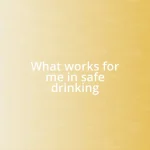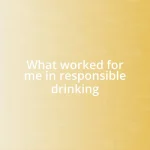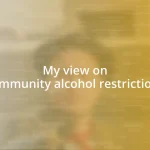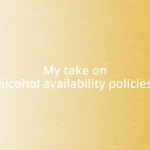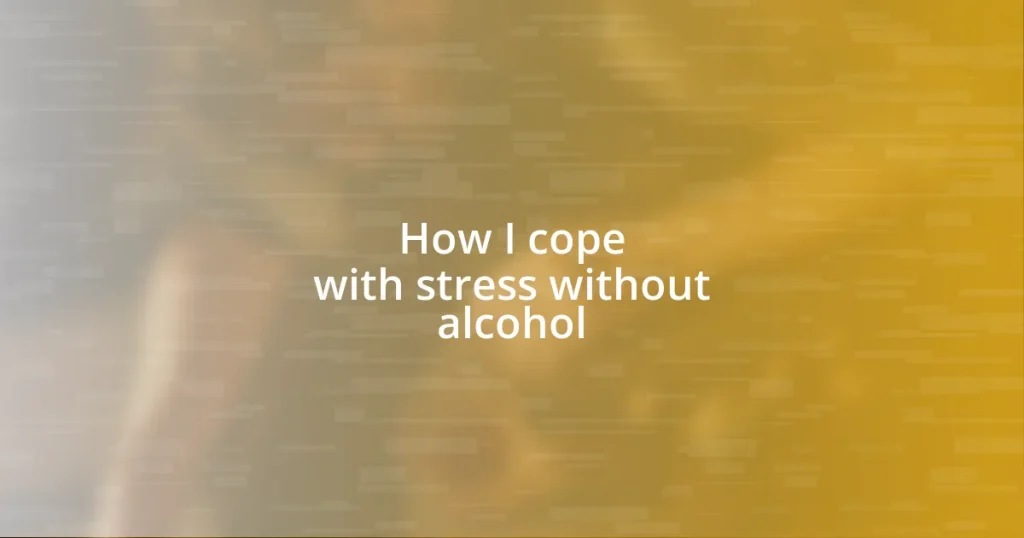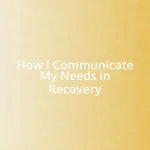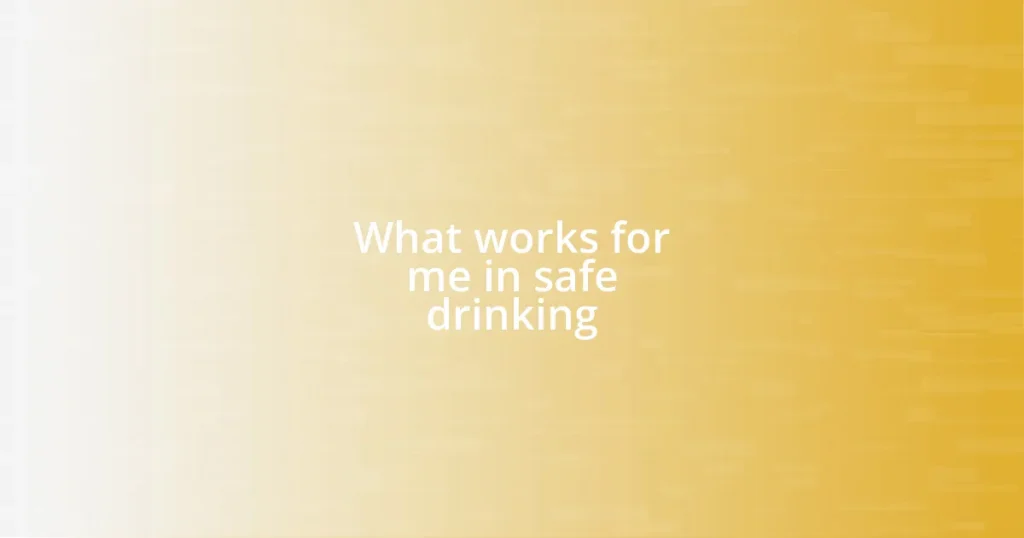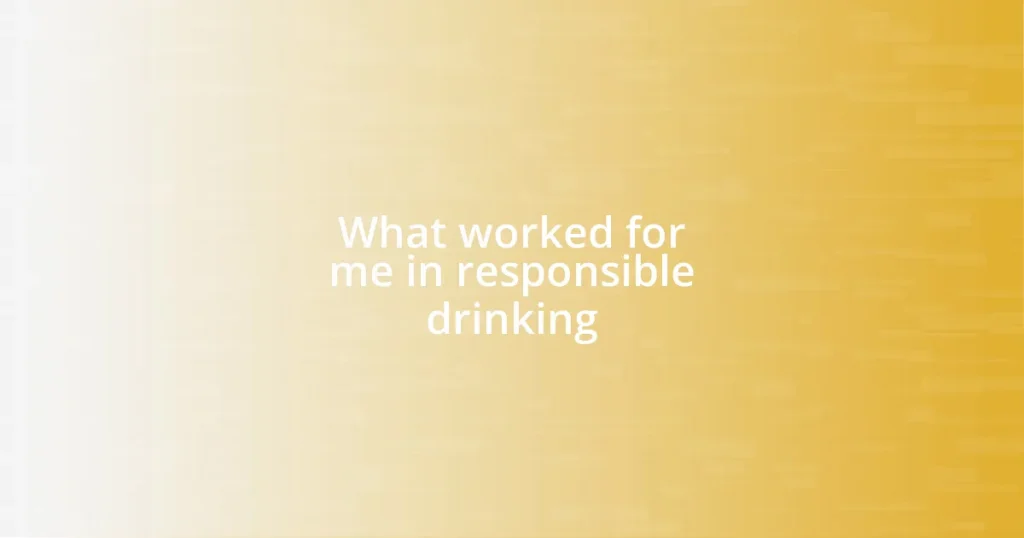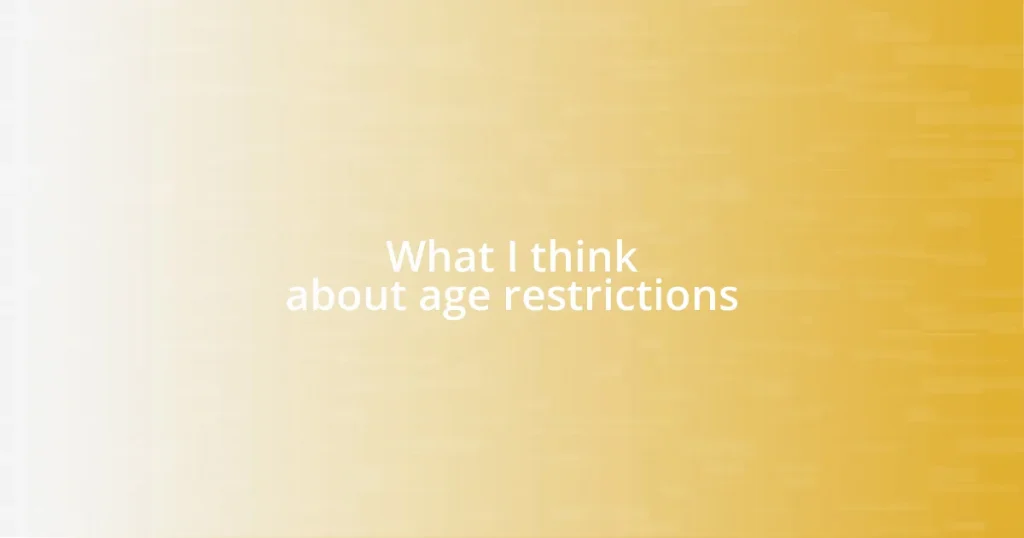Key takeaways:
- Alcohol may provide temporary relief from stress but often exacerbates anxiety and disrupts sleep.
- Identifying personal stress triggers, such as work overload and financial worries, allows for proactive coping strategies.
- Alternative coping strategies like yoga, journaling, and nature walks can effectively replace unhealthy habits like drinking.
- Building a support network and engaging in hobbies promote emotional resilience and balance in life.
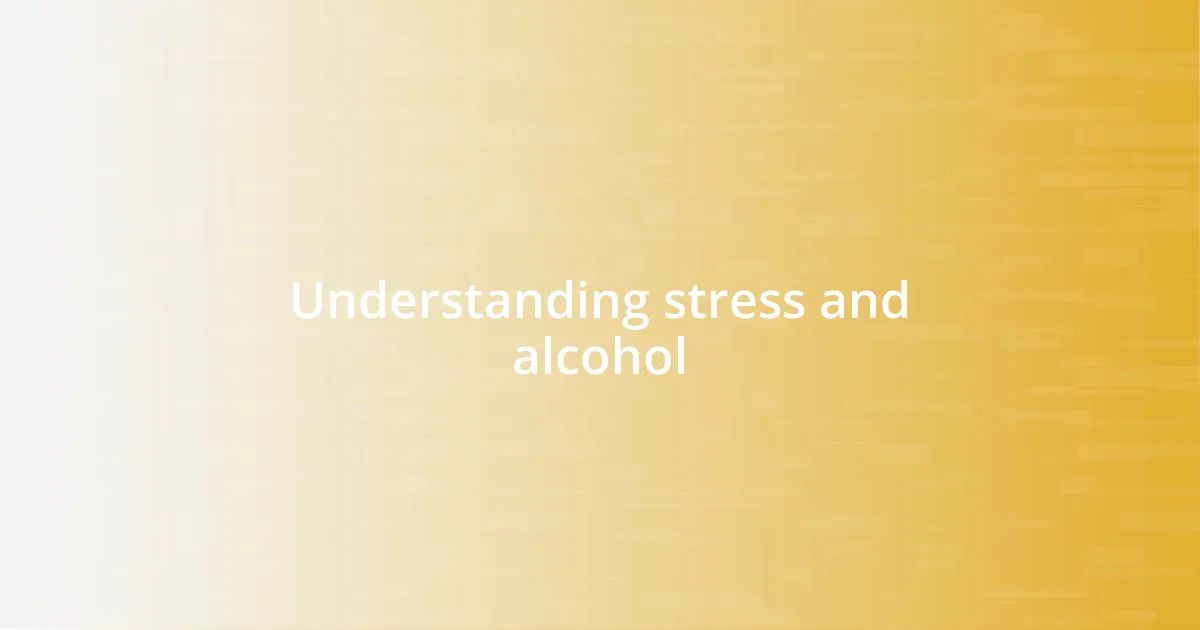
Understanding stress and alcohol
Stress is a common part of life, and many people turn to alcohol as a quick way to cope. I remember a time when I thought a glass of wine would wash my worries away. But did it really help? In my experience, the momentary relief was often followed by a deeper sense of anxiety the next day. It’s interesting how what seems like a solution can also mask underlying issues.
Alcohol might initially seem like a friend during stressful moments, but its effects can be deceiving. After a long day, I’d pour myself a drink, believing I was unwinding. However, I soon realized that it often led to disrupted sleep and a foggy mind. Have you ever noticed how a hangover can amplify feelings of stress? It’s a vicious cycle, and breaking free from it requires understanding what stress truly is and how we can manage it in healthier ways.
The relationship between stress and alcohol is a complicated one. Alcohol is a depressant, which means it can decrease our mood over time. Reflecting on my journey, I found that facing my stress head-on, rather than numbing it, allowed for true healing. What if we could replace that drink with something that genuinely lifts our spirits? Finding better coping strategies can be a game-changer.
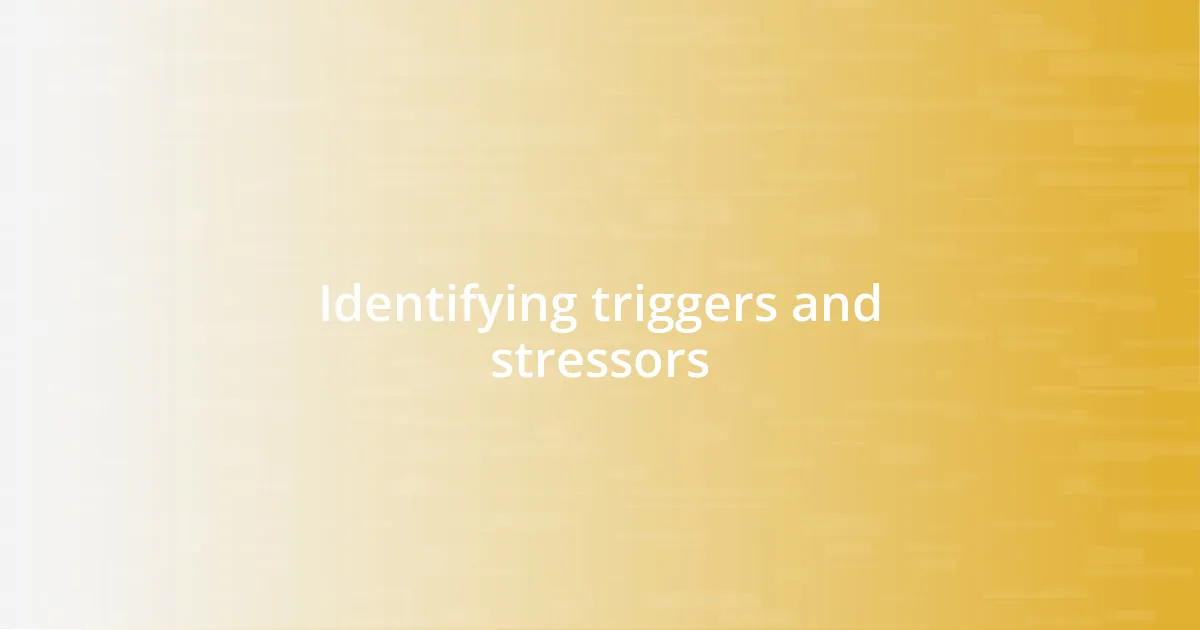
Identifying triggers and stressors
Understanding what triggers my stress has been a transformative journey. Early on, I didn’t realize how certain situations, like hectic work deadlines or strained relationships, could throw me into a tailspin. Now, I keep a mental list of my stressors, which helps me anticipate rather than react.
- Work overload: Long hours and tight deadlines can feel overwhelming.
- Social pressures: Situations that require me to engage socially when I’m not feeling up to it often ramp up my anxiety.
- Change in routine: I’ve noticed that even small disruptions can unsettle me, revealing a need for structure.
- Financial worries: Keeping track of bills or unexpected expenses can heighten my stress levels.
- Personal conflicts: Engaging in difficult conversations can significantly impact my mood.
Recognizing these triggers has allowed me to craft better responses. For instance, when I identify a looming deadline at work, I take proactive steps, like breaking tasks into smaller chunks. It’s fascinating how just bringing awareness to these stressors opens up a path toward healthier coping mechanisms.
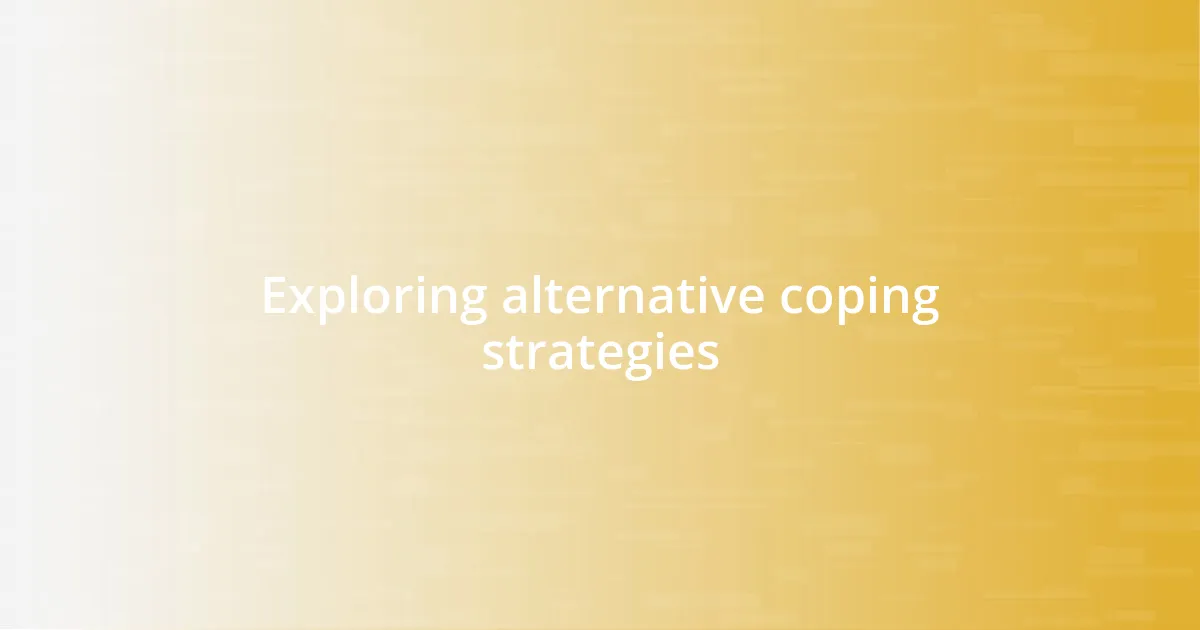
Exploring alternative coping strategies
Exploring different coping strategies has opened my eyes to the variety of alternatives available. I began with physical activities; I remember my first yoga class. The instructor’s calm voice and the soothing music made me feel like I was rediscovering myself. Focusing on my breath helped ground me, shifting my attention away from stressors and allowing clarity to emerge. Have you ever found relief in movement? It’s wonderful how a simple stretch can release built-up tension.
Another effective strategy I stumbled upon is journaling. I had always thought of writing as a chore, but once I started to pour my thoughts onto paper, it became liberating. It was like having a conversation with myself, a safe space where I could express my emotions without judgment. I recall a night when I felt overwhelmed, so instead of reaching for a drink, I wrote continuously for 20 minutes. The catharsis of seeing my worries laid out in front of me was surprisingly uplifting!
Lastly, connecting with nature has been an unusual yet refreshing method for combating stress. One weekend, I decided to take a hike. As I walked among the trees, I could feel the stress melting away with each step. The gentle rustle of leaves and the chirping of birds served as a reminder that life continues beyond my worries. It’s amazing how nature can restore balance and peace.
| Strategy | Benefits |
|---|---|
| Yoga | Helps clear the mind and reduce tension |
| Journaling | Provides a safe outlet for emotions and thoughts |
| Nature walks | Restores peace and promotes mindfulness |
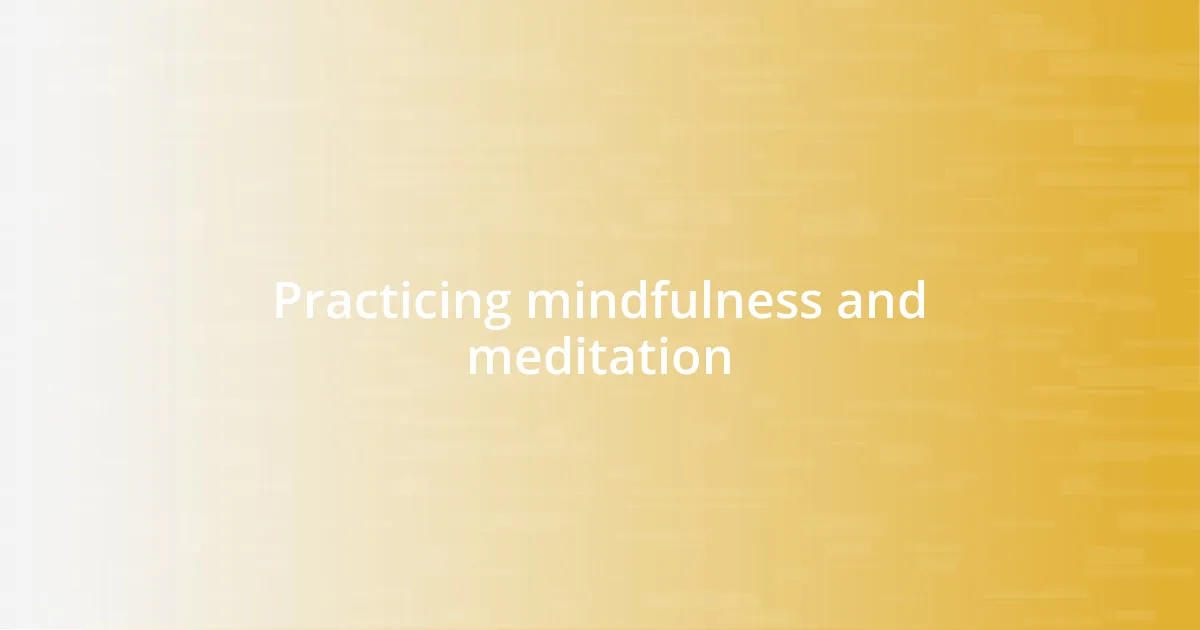
Practicing mindfulness and meditation
Practicing mindfulness and meditation has truly been a game-changer for me. I remember the first time I sat quietly and focused solely on my breathing; it felt almost foreign but strangely calming. Each inhale and exhale became a way to pull myself back from the chaos of my thoughts. Have you ever noticed how just five minutes of mindful breathing can create a bubble of tranquility in your day?
As I delved deeper into meditation, I discovered that it’s not just about sitting in silence. Guided meditations, for instance, became my go-to during stressful periods. I recall using an app while sitting in my car before heading into a challenging work meeting. Following the soothing voice led me to a place of clarity and calm, transforming my anxious energy into focused determination. It’s comforting to know that I can easily access that moment of peace anytime I need it.
Mindfulness extends beyond meditation; it’s about being present in everyday life, too. I’ve started to practice mindfulness even during mundane tasks, like washing dishes or walking my dog. I focus on the texture of the soap, the warmth of the water, or the rhythm of my steps. It seems trivial, but this practice brings a sense of joy and appreciation into routines that once felt like mere chores. Have you tried being fully present in a simple moment? It’s enlightening how it can turn the ordinary into an extraordinary experience.
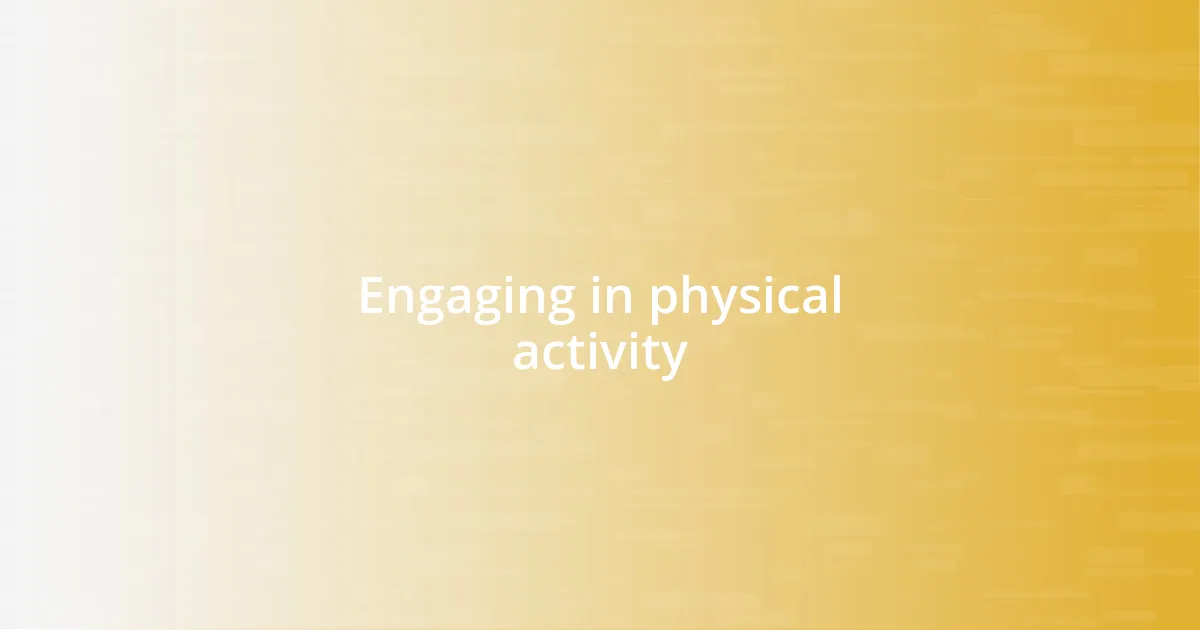
Engaging in physical activity
Engaging in physical activity has become my go-to method for channeling stress in healthier ways. I’m not just talking about hitting the gym; even dance parties in my living room do the trick! I remember a particularly rough day, so I cranked up my favorite playlist and danced like nobody was watching. Each beat felt like a release, washing away my worries with every twist and turn.
I’ve also discovered the power of a good run. There’s something about pounding the pavement that provides a unique clarity. One early morning, I set out for a jog and found myself lost in thought. The rhythm of my feet against the ground helped me process feelings I hadn’t even acknowledged. Have you ever had that moment when a simple run transforms into a therapy session with yourself? I find it exhilarating how my thoughts seem to untangle themselves with each mile.
Then there are the benefits of group sports. Joining a local soccer league brought a sense of community I never realized I needed. Picture this: battling through a tough match, laughing with teammates, and feeling that rush of adrenaline. The cumulative stress just fades away in the excitement of being active with others. Have you felt that kind of camaraderie through a shared activity? It’s rewarding to know that not only am I moving my body, but I’m also building connections that help dispel stress in a supportive environment.
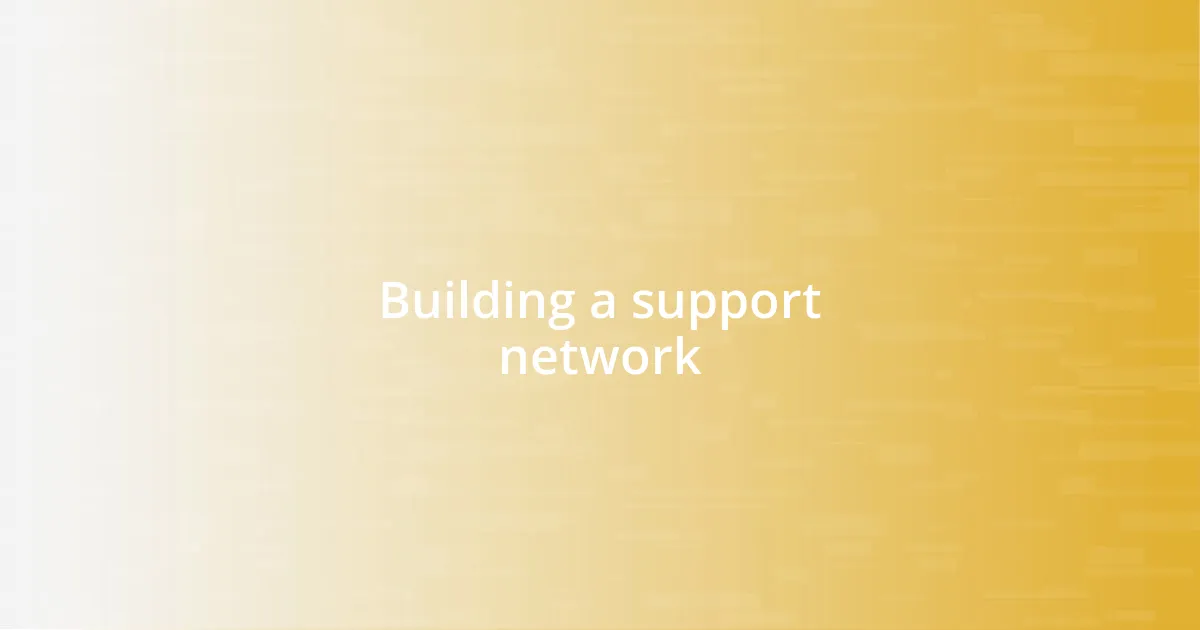
Building a support network
Building a support network has been vital in my journey of coping with stress without alcohol. I remember feeling overwhelmed and isolated during tough times, but reaching out to friends and family opened a new world of understanding. Sharing my struggles over coffee or a quick phone call made me realize that I’m not alone—have you ever felt that relief when someone simply listens?
Connecting with others who understand the challenges of stress can be incredibly empowering. I found this through support groups, both in-person and online, where people share their experiences. One night, I attended a group meeting and was amazed at how the stories resonated with my own. It felt liberating to talk openly, and I left feeling lighter. Have you considered how mutual support can uplift your spirits during hard moments?
Moreover, I’ve learned that it’s essential to nurture these connections intentionally. Organizing regular get-togethers or even sending simple text messages to check in can make all the difference. I often reflect on the times I’ve planned a walk with a friend—it’s during these conversations that I find strength and perspective. Have you thought about how consistent support can build resilience against stress? Each interaction seems to weave a stronger fabric of support in my life, helping me navigate challenges more effectively.
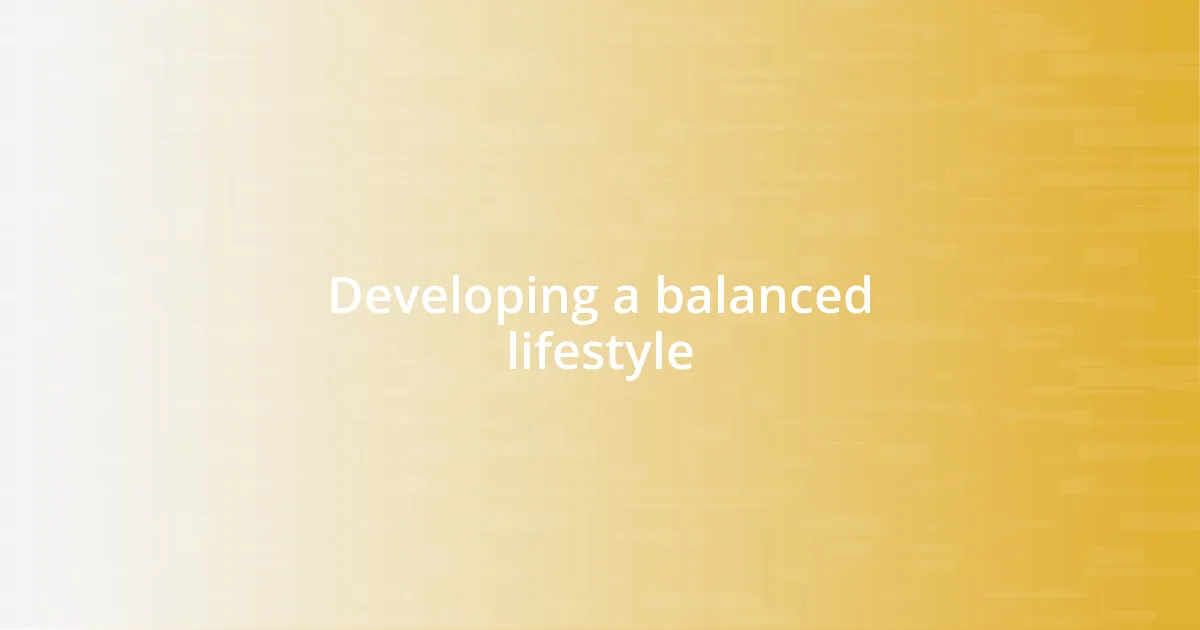
Developing a balanced lifestyle
Developing a balanced lifestyle has played a crucial role in my quest to manage stress without leaning on alcohol. I’ve wholeheartedly embraced the concept of moderation in all aspects of life. For example, I’ve started practicing mindfulness, and I can still picture that serene morning when I first sat in silence, focusing on my breath. It was as if a weight lifted off my chest. Have you ever had one of those moments when just a few minutes of mindful breathing made everything feel more manageable?
Another transformative change has been my approach to nutrition. I didn’t realize how much my food choices affected my mood until I paid closer attention. After replacing my late-night snacks of chips with fruits and nuts, I noticed a distinct change in my energy levels and overall well-being. I recall a time when I prepared a colorful salad filled with fresh veggies. As I savored every bite, the vibrant flavors filled me with joy and a sense of accomplishment. Have you thought about how nourishing meals can elevate your mental state?
Lastly, I’ve prioritized time for hobbies that genuinely bring me joy. One evening, I picked up my old guitar, a long-forgotten friend. Playing the chords felt like reconnecting with a part of myself I hadn’t acknowledged. It reminded me that engaging in activities we love can serve as a beautiful escape from stress. What hobbies do you find most fulfilling? By dedicating time to my interests, I’ve found a compelling outlet that helps dissolve stress, creating a sense of balance in my life.
